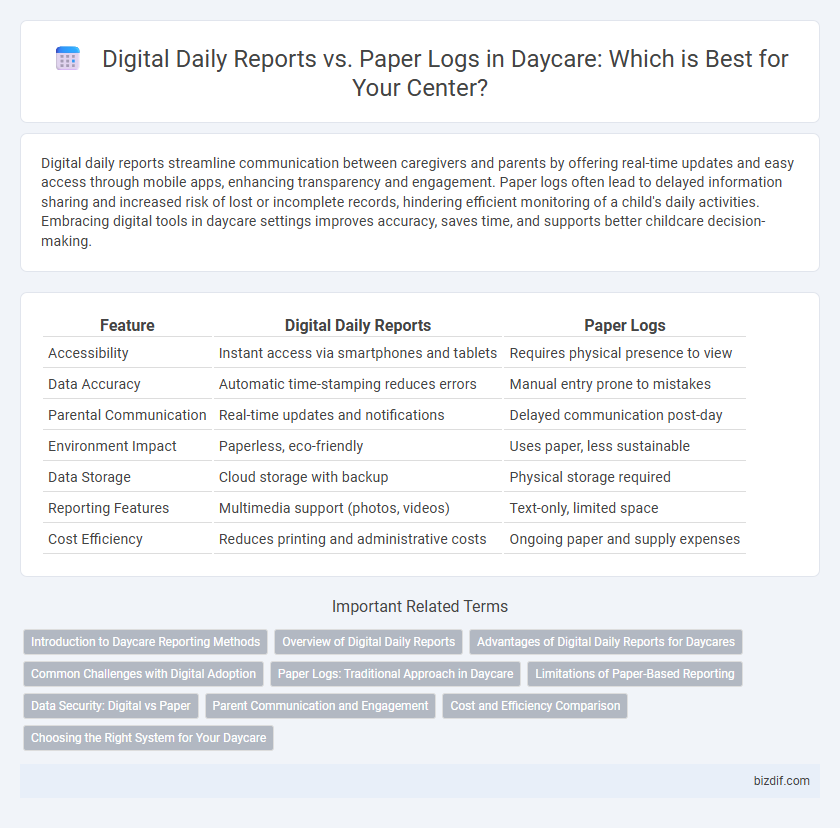Digital daily reports streamline communication between caregivers and parents by offering real-time updates and easy access through mobile apps, enhancing transparency and engagement. Paper logs often lead to delayed information sharing and increased risk of lost or incomplete records, hindering efficient monitoring of a child's daily activities. Embracing digital tools in daycare settings improves accuracy, saves time, and supports better childcare decision-making.
Table of Comparison
| Feature | Digital Daily Reports | Paper Logs |
|---|---|---|
| Accessibility | Instant access via smartphones and tablets | Requires physical presence to view |
| Data Accuracy | Automatic time-stamping reduces errors | Manual entry prone to mistakes |
| Parental Communication | Real-time updates and notifications | Delayed communication post-day |
| Environment Impact | Paperless, eco-friendly | Uses paper, less sustainable |
| Data Storage | Cloud storage with backup | Physical storage required |
| Reporting Features | Multimedia support (photos, videos) | Text-only, limited space |
| Cost Efficiency | Reduces printing and administrative costs | Ongoing paper and supply expenses |
Introduction to Daycare Reporting Methods
Daycare reporting methods have evolved from traditional paper logs to advanced digital daily reports, enhancing accuracy and accessibility. Digital daily reports streamline communication between caregivers and parents by providing real-time updates on child activities, meals, and nap times through mobile apps or online platforms. This transition supports improved record-keeping, reduces errors, and fosters a more transparent daycare environment.
Overview of Digital Daily Reports
Digital daily reports in daycare settings streamline communication by providing real-time updates on children's activities, meals, and naps through secure apps or software. These reports enhance accuracy, reduce paperwork errors, and allow parents easy access to detailed information anytime via smartphones. Integrating digital daily reports improves caregiver efficiency, supports better data tracking, and fosters transparency between daycare providers and families.
Advantages of Digital Daily Reports for Daycares
Digital daily reports for daycares enhance communication by providing real-time updates on children's activities, meals, and naps accessible to parents via mobile apps or online portals. These reports reduce errors and loss of information common in paper logs, ensuring accurate and easily retrievable records. Digital solutions streamline staff workflows with automated data entry and customizable templates, improving efficiency and accountability in daycare centers.
Common Challenges with Digital Adoption
Digital daily reports streamline communication between caregivers and parents but often face challenges such as technical glitches, inconsistent internet access, and varying digital literacy levels among staff. Transitioning from paper logs to digital platforms requires comprehensive training and ongoing support to ensure accurate data entry and timely updates. Security concerns and data privacy compliance also pose significant hurdles during digital adoption in daycare settings.
Paper Logs: Traditional Approach in Daycare
Paper logs in daycare settings serve as a traditional method for documenting daily activities, meals, and nap times, offering a tangible record easily accessible to caregivers and parents. These handwritten records facilitate personalized notes and immediate updates during the day, though they may lack the efficiency and searchability of digital systems. Despite their limitations, paper logs remain a reliable backup and provide a sense of familiarity for many daycare providers accustomed to established routines.
Limitations of Paper-Based Reporting
Paper logs in daycare settings often suffer from legibility issues and delayed information sharing, which can hinder timely communication between caregivers and parents. Physical records are prone to loss, damage, and misplacement, compromising the accuracy and reliability of children's daily activity tracking. Limited accessibility and difficulties in data organization further restrict their effectiveness compared to digital daily reports that streamline documentation and real-time updates.
Data Security: Digital vs Paper
Digital daily reports in daycare centers offer enhanced data security through encrypted storage and restricted access, minimizing the risk of unauthorized data breaches compared to paper logs. Paper logs are susceptible to physical loss, damage, and unauthorized viewing, making sensitive child information vulnerable to exposure. Implementing digital systems ensures compliance with privacy regulations and provides audit trails that bolster accountability in data management.
Parent Communication and Engagement
Digital daily reports enhance parent communication and engagement by providing real-time updates on their child's activities, meals, and naps, ensuring transparency and peace of mind. These digital tools allow parents to access detailed information anytime via smartphones or computers, promoting consistent and convenient interaction with caregivers. In contrast, paper logs often delay information sharing and limit the immediacy of feedback, potentially reducing parent involvement and satisfaction.
Cost and Efficiency Comparison
Digital daily reports in daycare settings reduce operational costs by eliminating paper, printing, and storage expenses while enhancing efficiency through real-time updates and automated data entry. Paper logs require manual documentation and physical storage, increasing time spent on administrative tasks and risk of lost or damaged records. Transitioning to digital reporting systems streamlines communication, accelerates information sharing with parents, and supports better resource management.
Choosing the Right System for Your Daycare
Digital daily reports offer real-time updates, easy data access, and enhanced communication between staff and parents, improving overall daycare management efficiency. Paper logs, while traditional, can be prone to data loss, slower information sharing, and increased administrative workload. Opting for a digital system supports accurate record-keeping, streamlined documentation, and better compliance with childcare regulations.
Digital Daily Reports vs Paper Logs Infographic

 bizdif.com
bizdif.com